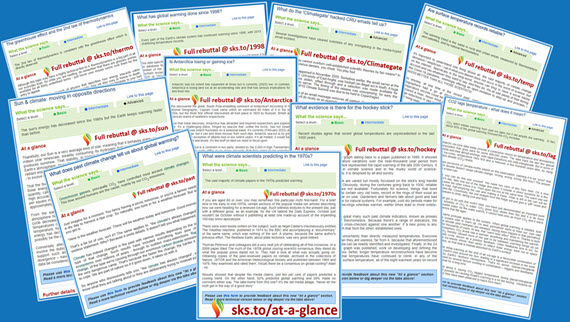
We are pleased to announce that a major new project is well underway at Skeptical Science. The work involves not only updating our popular rebuttals for the most-used climate myths but also adding entry-level sections to each topic, thereby widening the accessibility of the resource to as many folk as possible. And we want you, the readers, to join in with the project.
Why was Skeptical Science put together in the first place? Because of climate science deniers. Who? Deniers, or denialists, are people motivated to argue against reality. Climate change is just one example of a topic that attracts such attention. Previously, campaigns were run, for example, to gloss over the harmful effects of tobacco smoke. Tellingly, some of the same actors were involved in both campaigns.
What was the root cause of climate science denial? Profit, or more precisely perceived loss of profit. The response of the fossil fuels sector to the perceived changes required to address global warming was to engage in a concerted campaign to play down its seriousness. Climate change thereby became politicised. Creation and circulation of the political talking-points was easy: the pre-existing network of free market and Conservative-leaning think-tanks and media channels was ready and waiting.
Talking-points were carefully crafted and then tested with focus groups to determine their “stickiness” - meaning that a sticky message would take hold in peoples' minds, no matter how untrue it was. They were not messing around. In this game, all that was needed was to spread doubt and confusion.
From this embryonic start, climate science denial spread like a deadly plague. Books, bogus journals, fake conferences and documentaries also played their part as people increasingly fell victim to the onslaught of misinformation. Those actively promoting climate change denialism (Tier 1 deniers) relied on such an effect taking place: they needed a citizens' army to repeat those sticky messages (Tier 2 deniers) and they got one.
For those interested in further reading on this matter, well-documented in its entirety, it’s worth getting hold of a copy of the excellent book, Climate Cover-up, by James Hoggan and Richard Littlemore. It has aged well since its publication in 2009 - by which time much of the damage had been done. The first chapter is available here in PDF format as a taster.
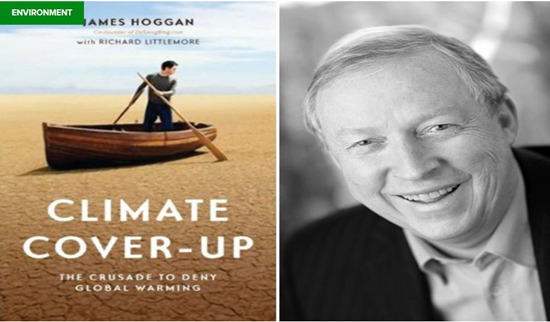
Above - Front cover of Climate Cover-up - an account of how the organised climate change denial campaign evolved. As Bill McKibben commented about that campaign: “Forget about the crime of the century – this probably qualifies as the crime of the geological epoch.”
Skeptical Science, founded by John Cook in 2007, was always the David fighting Goliath in this very unevenly-sided battle, but it has continued to root out misinformation ever since its inception. Its aim was always to provide a science-based response to climate science denialism. It was a remarkable, even heroic effort, built by a small but determined team of volunteers.
Our well-used database of denialist talking points has had over 36 million views since 2017 alone. The database carries entries on over 200 climate change denial talking points, referred to as “Myths”, and the science-based rebuttals to each of them. Many of these rebuttals date back to 2010 or earlier and in some cases developments in science have rendered these originals out of date (and the myths even more ridiculous). We started an updating programme some years ago, but now we are taking a more structured approach.
We decided that rather than fix these rebuttals in an ad-hoc fashion, a full review would be useful as a first step. The review found that most rebuttals lacked an entry-level version, an easy read for people unfamiliar with the terminology and methods of science. This is a major accessibility issue. Some rebuttals had a “basic” version but no “intermediate” or “advanced” equivalents. In other cases, there was only an intermediate entry. Some basic-level rebuttals were written in a more accessible style than others. So we have identified a number of tasks to undertake.
As an initial step we took a sample of the most frequently-read rebuttals and updated them to include entry-level versions. These “at-a-glance” sections are short (ideally under 500 words) and written in a style intended to hold the reader from start to finish.
Three key principles are employed with the “at a glance” sections, based on the assumption that we may at times be visited by readers who are interested but who are relatively new to the subject. Firstly, we strive to write engagingly, as if we are having a friendly fire-side conversation, using analogies with everyday life where possible. Secondly, we try to avoid anything that could be distracting such as links or anything off-putting like unnecessary or unintroduced technical terms. Last but not least, the end of each short rebuttal should be memorable, so it sticks in the reader’s mind.
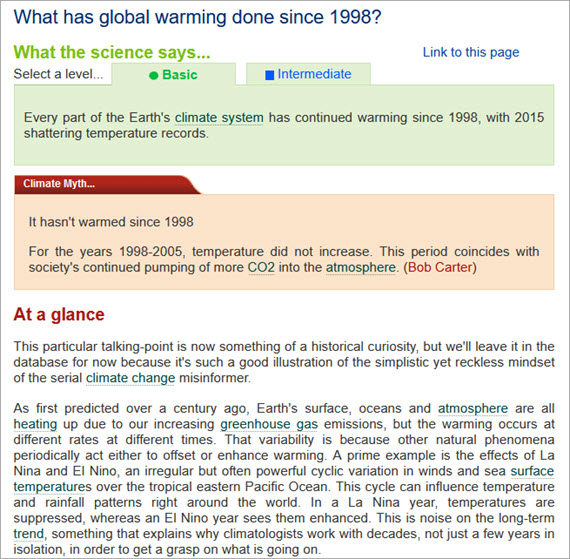
Above - a new-style rebuttal for a well-known climate myth now including the "at a glance" section.
Beneath each such entry-level section is the existing “basic” rebuttal, updated where necessary and headed “Further details”. The reader will therefore already be in the existing system, familiar to regular readers of Skeptical Science, that includes links to the more heavily-referenced intermediate and advanced-level rebuttals. Note that some excellent updating work has already been done – but only for some rebuttals.
This first batch of new rebuttals is a pick from a larger number we have completed. They were selected to provide a range of topics that vary in their complexity. At one end there are frankly daft statements like "the climate's changed before". Daft because it's a meaningless statement to make, without revealing what happened when it did. At the other, we deal with contentious claims such as the greenhouse gas theory breaking the second law of thermodynamics, where a minor treatise is required to explain Earth's energy budget and heat transfer within the atmosphere. It's easy to create denialist talking-points about such things but it's a lot harder to properly rebut such claims because it becomes necessary to tell the reader what is actually going on.
Many advanced rebuttals are pretty much journal-standard pieces, often written by a specialist working at that level. Based on our stats, the demographic that reads these is relatively small. Our priority for this first round of updates is therefore to add an at-a-glance section to each basic rebuttal and applying updates to these and the intermediate rebuttal versions as needed. After all, the vast majority of people we need to reach exist outside of the world of science and almost certainly outside of climate science, where the consensus that humans are causing global warming is very strong indeed. If we are to create a resource that is universally useful, we need to address that particular point. Nevertheless, if you once authored an advanced rebuttal and feel you can now add an update, then please feel free to get in touch with us!
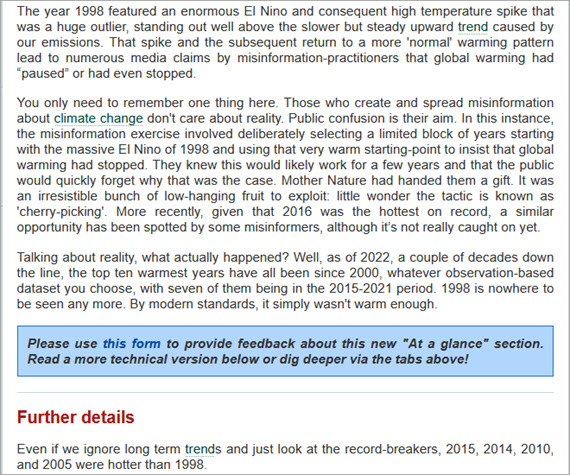
Above - another section of the same rebuttal, with the feedback form linked above "Further details".
Where do you, our regular readers, come into the equation? Well, before we further develop this system, we would like to get some feedback from you. A special kind of feedback in fact. We invite you to look at the selection of rebuttals we've now completed and fill out the Google-form you’ll see at the end of “at a glance” in the blue box. We’d also very much appreciate it if you shared our ask with friends and relatives to read the at-a-glance sections and to gauge their usefulness by providing feedback as well. We want to know whether those short pieces have improved their understanding of climate-related issues.
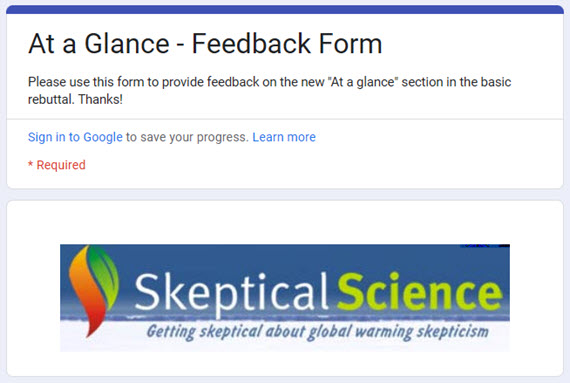
Ideally, the people you forward this to will be from outside the world of science and ambivalent with regard to the whole area of climate change. Why? We want to determine how we can play our part to help people understand, especially those in a fence-sitting position (a huge demographic), why action on climate change is so important. Get enough of those on-board and a movement becomes a torrent. Please follow the links below to view the updated rebuttals.
If you think that projects like these rebuttal updates are a good idea, please visit our support page to contribute!
Posted by John Mason on Tuesday, 14 February, 2023
 |
The Skeptical Science website by Skeptical Science is licensed under a Creative Commons Attribution 3.0 Unported License. |